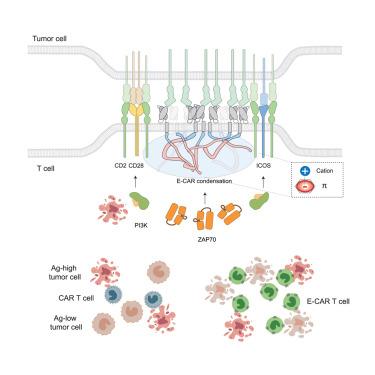Phase separation of chimeric antigen receptor promotes immunological synapse maturation and persistent cytotoxicity
IF 25.5
1区 医学
Q1 IMMUNOLOGY
引用次数: 0
Abstract
Major challenges of chimeric antigen receptor (CAR)-T cell therapy include poor antigen sensitivity and cell persistence. Here, we report a solution to these issues by exploiting CAR phase separation. We found that incorporation of an engineered T cell receptor CD3ε motif, EB6I, into the conventional 28Z or BBZ CAR induced self-phase separation through cation-π interactions. EB6I CAR formed a mature immunological synapse with the CD2 corolla to transduce efficient antigen and costimulatory signaling, although its tonic signaling remained low. Functionally, EB6I CAR-T cells exhibited improved signaling and cytotoxicity against low-antigen tumor cells and persistent tumor-killing function. In multiple primary and relapsed murine tumor models, EB6I CAR-T cells exerted better antitumor functions than conventional CAR-T cells against blood and solid cancers. This study thus unveils a CAR engineering strategy to improve CAR-T cell immunity by leveraging molecular condensation and signaling integration.

嵌合抗原受体的相分离促进免疫突触成熟和持续细胞毒性
嵌合抗原受体(CAR)-T 细胞疗法面临的主要挑战包括抗原敏感性差和细胞持久性。在此,我们报告了利用 CAR 相分离解决这些问题的方法。我们发现,在传统的28Z或BBZ CAR中加入工程化T细胞受体CD3ε基团EB6I,可通过阳离子-π相互作用诱导自相位分离。EB6I CAR与CD2花冠形成了成熟的免疫突触,可传递高效的抗原和成本刺激信号,但其强直性信号仍然较低。在功能上,EB6I CAR-T 细胞对低抗原肿瘤细胞的信号转导和细胞毒性得到了改善,并具有持续的肿瘤杀伤功能。在多个原发性和复发性小鼠肿瘤模型中,EB6I CAR-T细胞比传统的CAR-T细胞对血癌和实体瘤具有更好的抗肿瘤功能。因此,这项研究揭示了一种 CAR 工程策略,即利用分子凝集和信号整合来提高 CAR-T 细胞的免疫力。
本文章由计算机程序翻译,如有差异,请以英文原文为准。
求助全文
约1分钟内获得全文
求助全文
来源期刊

Immunity
医学-免疫学
CiteScore
49.40
自引率
2.20%
发文量
205
审稿时长
6 months
期刊介绍:
Immunity is a publication that focuses on publishing significant advancements in research related to immunology. We encourage the submission of studies that offer groundbreaking immunological discoveries, whether at the molecular, cellular, or whole organism level. Topics of interest encompass a wide range, such as cancer, infectious diseases, neuroimmunology, autoimmune diseases, allergies, mucosal immunity, metabolic diseases, and homeostasis.
 求助内容:
求助内容: 应助结果提醒方式:
应助结果提醒方式:


